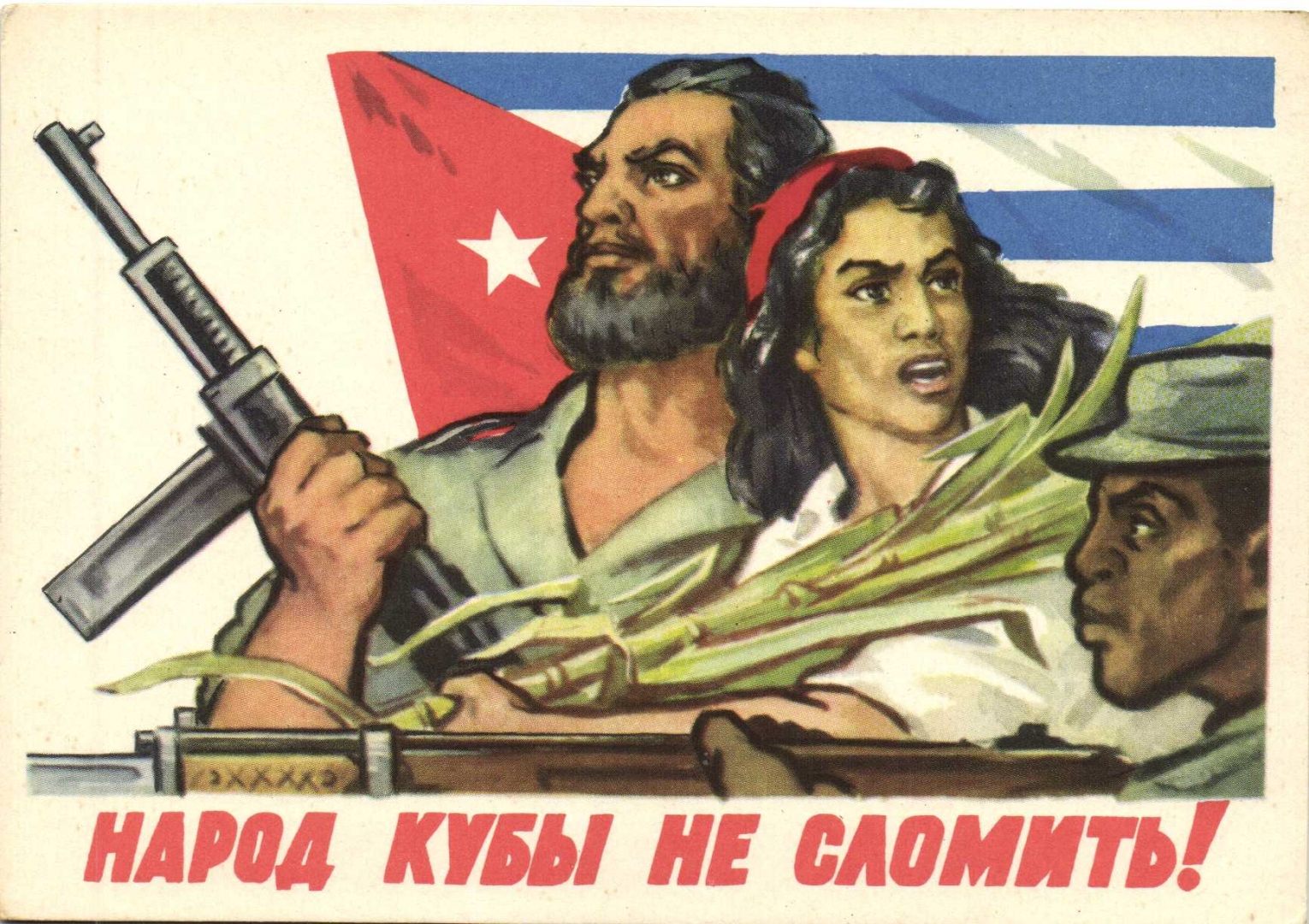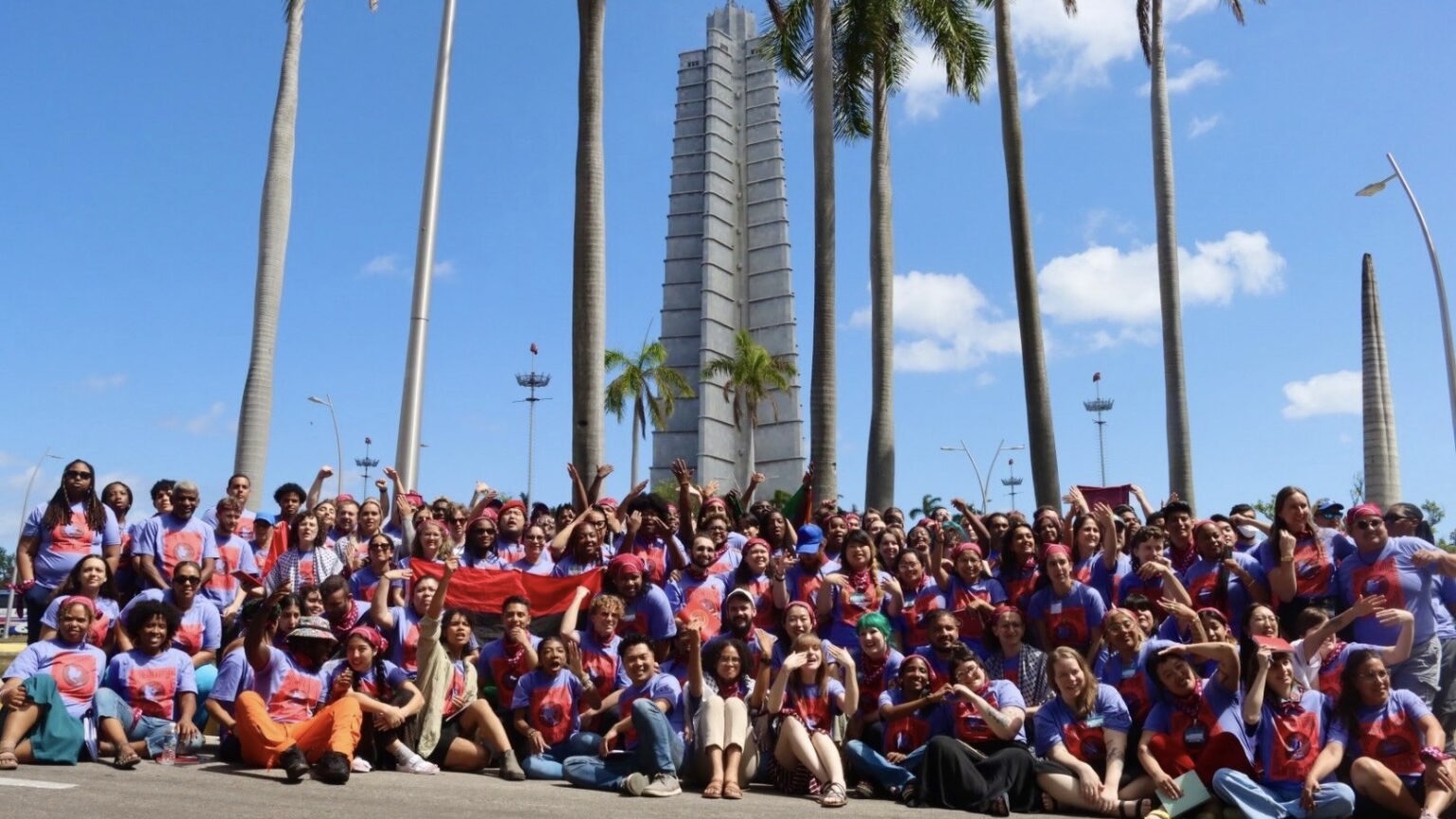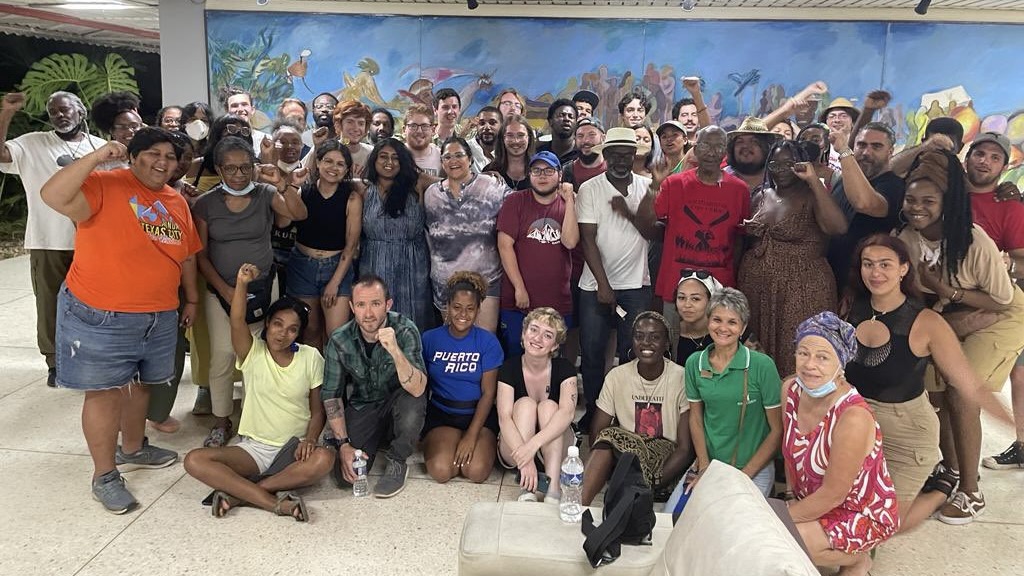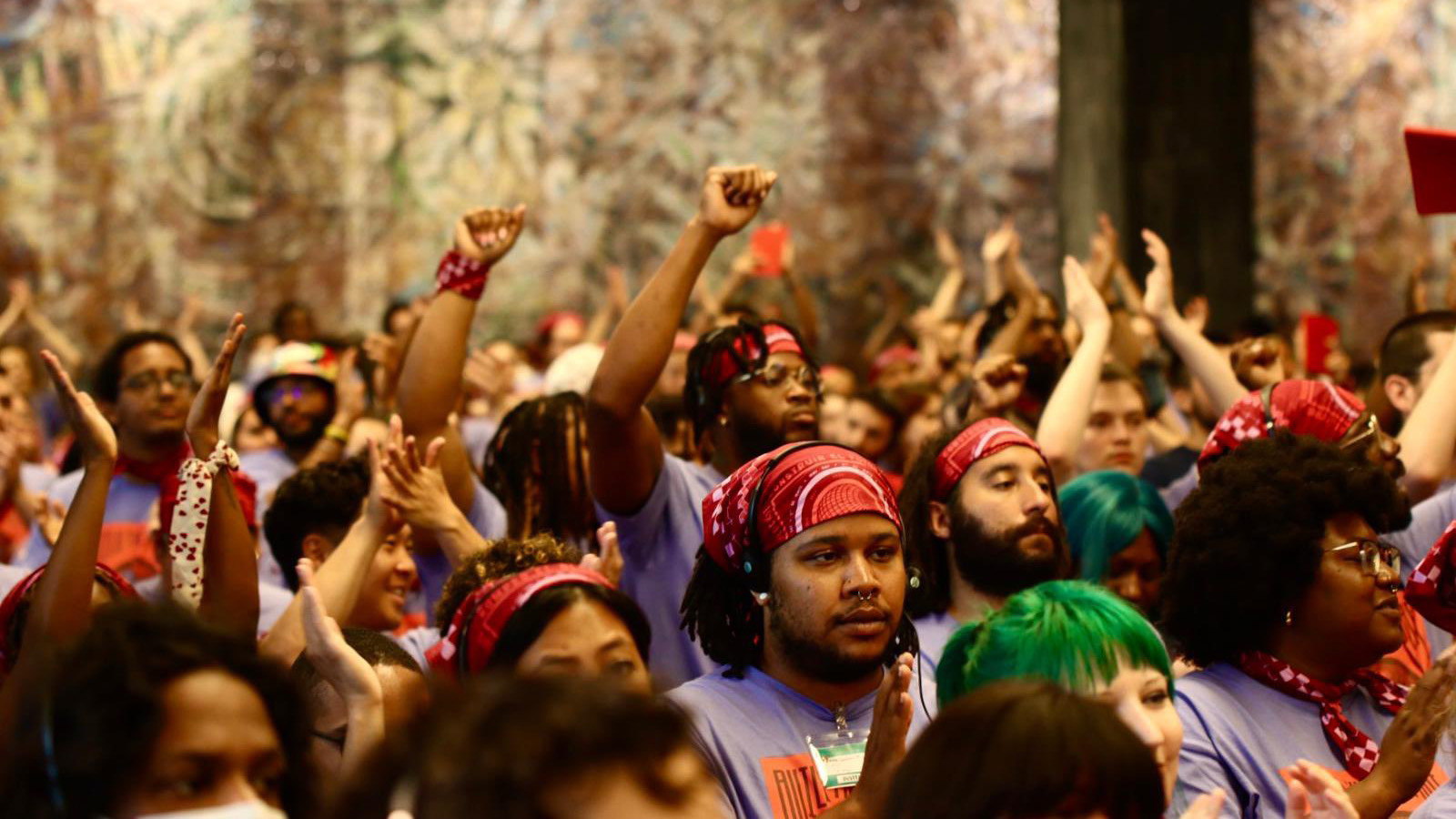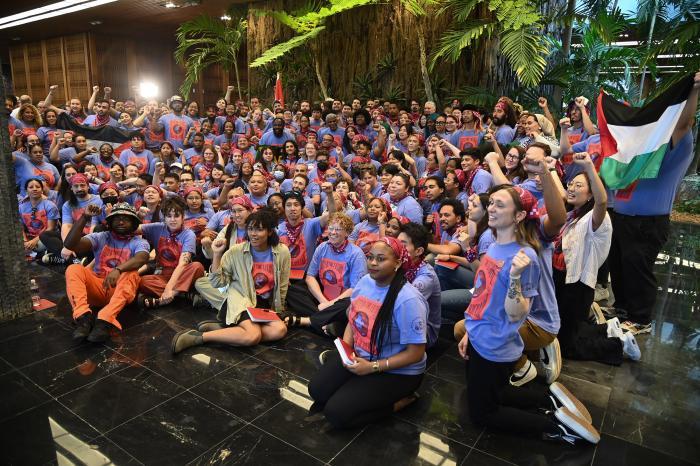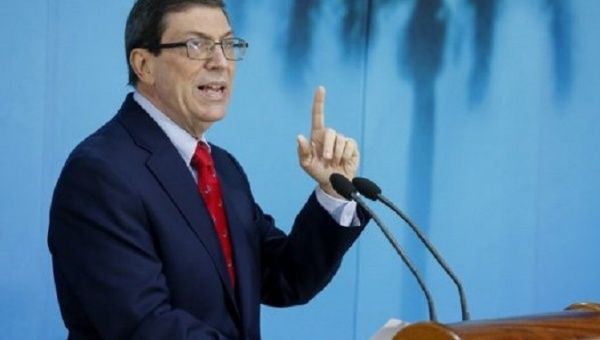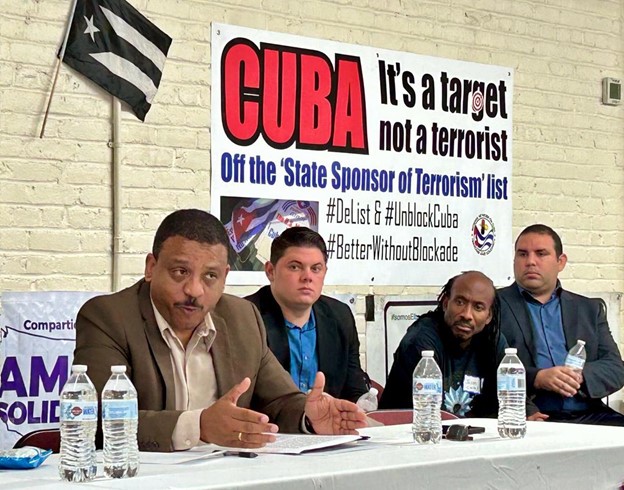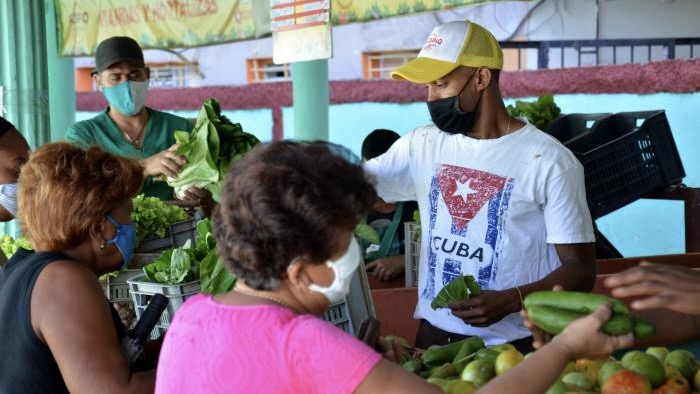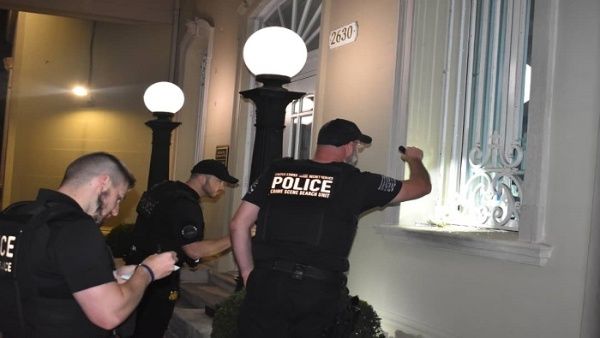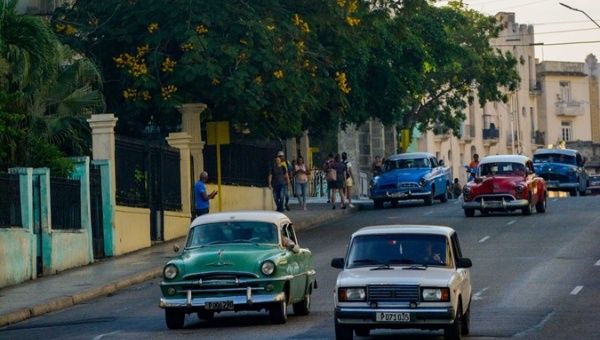The IPA invited young activists across a diversity of struggles in the US to participate in an exchange in Cuba, an experience deprived of them and their generation by the blockade
April 26, 2023 by Manolo De Los Santos, Kate Gonzales
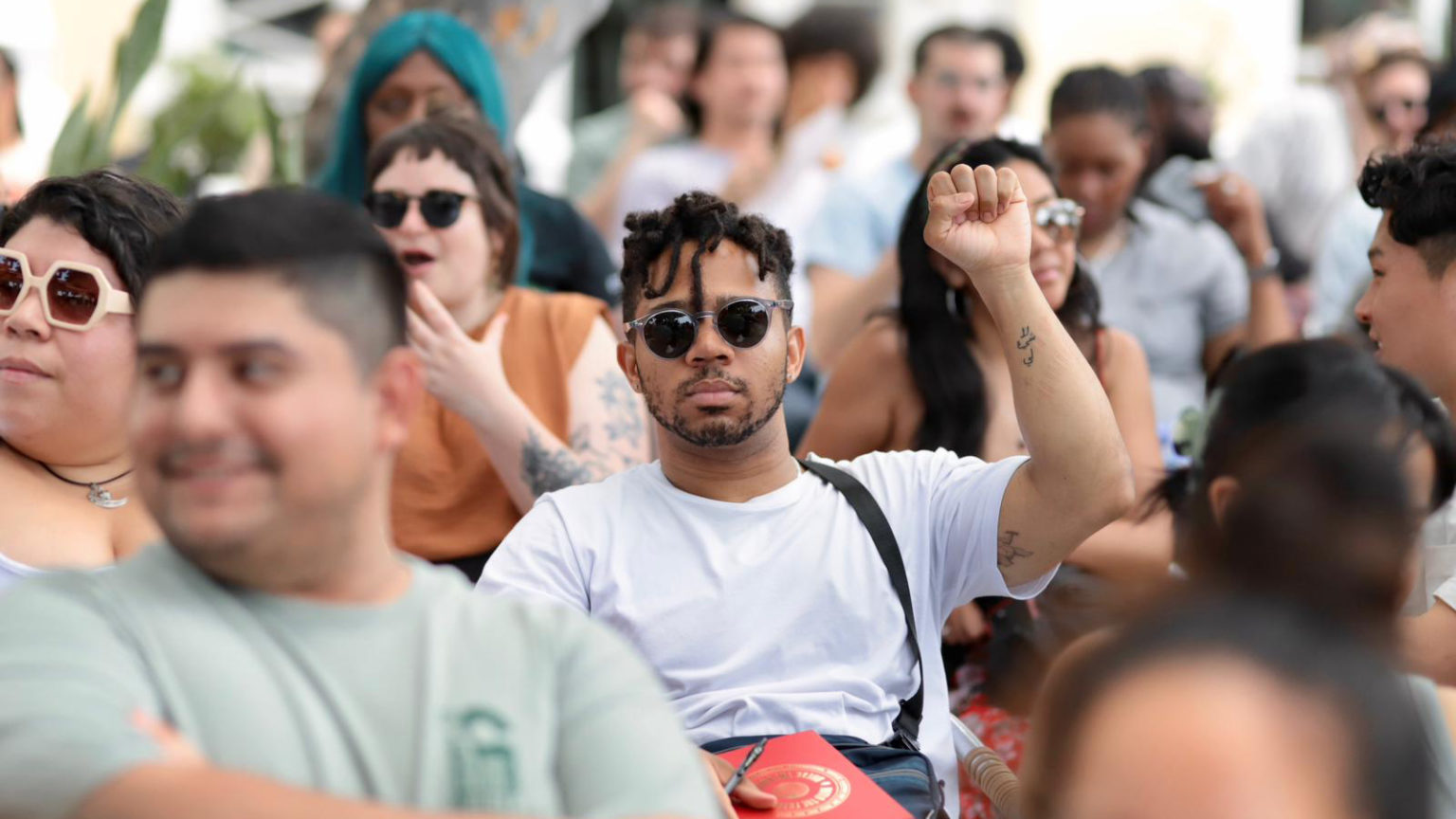
150 young organizers from the US sit shoulder to shoulder, listening attentively to leaders of the cultural movement in Cuba
It’s a hot and crowded Tuesday morning in the Yoruba Cultural Center in Havana, and the air sticks to the skin. You can hear the fluttering of paper as people fan themselves, and a surprise blackout takes out the sound system with a flicker of the lights. And yet, 150 young organizers from the US sit shoulder to shoulder, listening attentively to two leaders of the cultural movement in Cuba. They line up and down the hall with the hope of squeezing in their question—on climate change, on housing, on fighting racism, about hope in the future—before time is up.
This energy permeates through and drives the 2023 May Day Brigade: a sharp sense of curiosity honed by the responsibility of this historic undertaking. The International Peoples’ Assembly invited young grassroots activists from across the diversity of struggles in the US to participate in a crucial exchange in Cuba, an experience deprived of them and their generation by the 60-year-old blockade. The largest group to travel in decades, this brigade is an intervention into the endless attempts of the United States to silence and strangle the successes of the Cuban socialist project. As Zuleica Romay, director of the Afro-American Studies program at Casa de las Américas, said in their morning panel, “Cuba is also a victim of its own success.”
And yet, these successes are contagious and hard-earned. On their very first day, these young people spoke to leaders pioneering the very sectors they fight to build back at home. Tenant organizers learned about the housing situation, as over 80 percent of Cubans are homeowners (the rest are on a path to ownership), but also the difficulty of building enough for a growing population burdened by the blockade. Black leaders asked about anti-racism efforts after 500 years of colonialism sowed the seeds of segregation and violence on the island. Those fighting for queer liberation in the US learned about the historic Families Code, passed and edited by six million Cubans who proposed hundreds of thousands of changes. The breakthrough code spans all issues of the family unit from same-sex marriage to elder care, to surrogacy, to non-normative family structures. Abel Prieto, president of Casa de las Américas, told us: “There is something the US government has never understood which is that something was planted here in Cuba, this principle of social justice, of people’s democracy, of equality, of people’s participation in the political process. And this has not been weakened.” Meanwhile, these young organizers repeatedly explain the current regression of trans rights in Florida as the state passes a broad ban on trans-affirming care—a ban that goes as far as stripping parental rights from those who support their trans children. Many in the crowd nod their heads in agreement.
Still, it is not lost on these young organizers that they have arrived in Cuba in a moment of profound economic crisis. As they admire the famous Cuban cars from the ’50s roll through Old Havana, they know how precious fuel is at this very moment, prevented by the blockade. Biden shows no sign of lifting the sanctions, nor taking the country off the State Sponsors of Terrorism list that prevents it from accessing the global financial system. It is this system of unilateral coercive measures that makes it almost impossible for young people to witness the achievements of a socialist process. It is US foreign policy at its most irrational and its most deadly, as it continues its siege on Cuba. It has never been more urgent to lift the blockade, for the survival of the Cuban people, and for the future of the United States. These young organizers are fighting for a better world, and this first day is just a glimpse into a future with normal relations between the US and this island just 90 miles away.
https://peoplesdispatch.org/2023/04/26/ ... the-siege/
*************
Giron. The Unforgivable Victory (Part One)
The fully mobilized and prepared revolutionary forces were ready to defend their independence.
In deep
APRIL 19, 2023
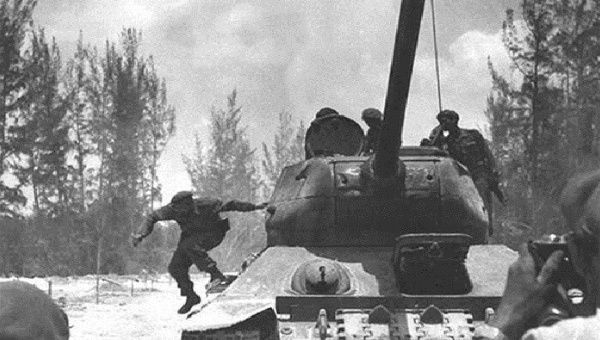
The fully mobilized and prepared revolutionary forces were ready to defend their independence.
Fidel's concern was to prevent the mercenaries from returning to the boats. "We can't let them go," he insisted.
It was around 05:30 a.m. (local time) on April 15, 1961, when the eight B-26 planes, camouflaged with the insignia of the Revolutionary Armed Forces, bombed by surprise points in Ciudad Libertad, San Antonio de los Baños and Santiago de Cuba.
The fighters were on alert at the General Staff. “We were there,” recalled the commander in chief, Fidel Castro Ruz. “We leaned out and saw that it was indeed an attack with
bombs, of a military nature, on Ciudad Libertad, in the part where the Artillery School and the airfields are. It was attacking. Another B-26 immediately approached."
"This is the aggression!" He said because he had foreseen it in advance. This made it possible to organize and arm the Cuban people, the decisive fighting force alongside the Rebel Army. The mercenaries came with everything for the coup. With five merchant ships, two war units, three barges and four cargo boats
, an army of exiles recruited and trained in some 13 training camps in the United States, Puerto Rico, Panama, Nicaragua and Guatemala.
Tim Weiner, in his book 'Legacy of Ashes. History of the CIA', refers that "with its own airport, its own brothel and its own codes of conduct", describing the coexistence around the main training camp in Guatemala, until they arrived in Cuba through Playa Larga and Playa Girón, that early morning of April 17, 1961.
end the revolution
In January 1961, the empire began military maneuvers, after materializing a sudden break in diplomatic relations with the island's government, which they considered a serious and urgent challenge. Cuba was already the theme of presentation in the 1960 presidential campaign between Nixon and John F. Kennedy, of the Republican and Democratic parties, respectively.
With the objective of liquidating the Cuban Revolution, one year and one month before the invasion, US President Dwight David "Ike" Eisenhower, the Pentagon and the Central Intelligence Agency unleashed the sinister plan by approving Operation Pluto,
the March 17, 1960.
But this plan had a precedent, rather a conclusion derived from the meeting held for three hours in Washington, by Cuban Prime Minister Fidel Castro and Vice President Richard Nixon, on April 19, 1959. After this, Nixon confirmed that it would
be necessary to act against Cuba because they would build a political system contrary to the interests of the Government of the United States (USA). From there he elaborated the "Cuba Project", under the direction of CIA deputy director Richard Bissell, to destroy the Cuban Revolution.
In the secret memorandum of the then Assistant Undersecretary of State, Lester Mallory, the specific objectives of the sinister plan were listed: “The majority of Cubans support Castro,” the document states, “[...] There is no effective political opposition […]
The The only possible way to make [the government] lose domestic support is to provoke disappointment and discouragement through economic dissatisfaction and hardship […] All possible means must be put into practice quickly to weaken economic life […] by denying Cuba money and supplies in order to reduce nominal and real wages, with the aim of causing hunger, despair and the overthrow of the Government.”
The set of measures to be taken was called the "Covert Action Program against the Castro regime." [1]
they miscalculated
The war maneuver for the remembered Bay of Pigs or Playa Girón was inspired by the most difficult amphibious operation of the Pacific War: the assault on Iwo Jima; and in Inchon, in North Korea.
They believed it was a similar scenario. Coasts without a port and landing points on the beaches, but this time they experimented doing it at night. They did not contemplate that this Caribbean area full of reefs
would prevent the proximity of ships and boats; nor that upon accessing they would find themselves in a rocky land, a hostile mountain and to the north, an absolutely impassable swamp.
Before, they considered that the experience of the colonel of the US Marine Corps, Jack Hawkins -Frank, for the mercenaries- commanding Brigade 2506 would be very useful. They also planned to document his feat of destroying the Cuban Revolution by incorporating a war correspondent with a film camera in each battalion.
The more than 1,550 men of the 2506 Assault Brigade, supported by artillery, armored tanks, planes and paratroopers who came in the invasion, had the support of some rebel individuals, who still operated in the Escambray mountainous area, in the center of the island and small groups opposed to the revolutionary government. Together, they calculated that they could establish a puppet government that would demand
direct US intervention.
Raise the flags higher
After the air attack, Fidel knew that the invasion would take place in a matter of hours, but they did not know from where.
He had already given prior instructions to disperse the planes of the Revolutionary Air Force. No one would know which aircraft were active, nor would they even surprise two aircraft together, to minimize the aggressive impact.
That April 16 was a different Sunday for Cubans, a prelude to the war unleashed by the empire. While the defensive forces remained with indications of a "state of maximum alert", the burial of the seven victims of the air attack took place.
It was also that Sunday that the socialist character of the Revolution was declared, less than 10 kilometers from the bombed base where a young teacher died while running towards his weapon, to repel the attack. The militiaman Eduardo García Delgado wrote Fidel's name seconds before he died. That piece of that bloody door was there, in front of all the combatants
and the people, at the entrance to the Colón Cemetery.
“And when the time for aggression arrives and when the time for combat arrives, that is when the flags must be raised higher. The revolutionary flag had to be raised higher than ever before the
devious and cowardly enemy that was attacking us, against the powerful imperialist government that was preparing the invasion”, recalled Fidel.
In less than 72 hours
An urgent message arrived from Playa Larga to Central Australia, in the early hours of April 17: the attack began from the sea, by a medium-sized boat.
The revolutionary forces, fully mobilized and prepared in the handling of weapons, were ready to defend their independence. The General Staff examined the special conditions of the Ciénaga de Zapata. They analyzed its characteristics of isolation from the rest of the country and its proximity to Havana, the capital of Cuba.
At the time of the invasion, there were 200 teachers teaching literacy in one of the pilot sites of the Literacy Campaign: the Ciénaga de Zapata, in Jagüey Grande, Covadonga, Australia. [2]
Just a narrow-gauge railway was the only communication that the peasants and coalmen in that area had. In this brief time of the revolutionary government, three embankments were built, which connected the Ciénaga de Zapata on the north with the central Australia and Jagüey Grande with Playa Larga. To the east, from Yaguaramas to San Blas and to the northwest from the Covadonga mill to San Blas.
Based on this evaluation, it is the commander-in-chief who advises on the strategy: the main blow will be around here.
The School of Militia Leaders of Matanzas had the mission of guarding and defending the access of the revolutionary troops -in the event of a landing- from one of those three highways: the one that went from the Australia sugar mill to Playa Larga
.
All combatants were emergently instructed. "So we invented something, which was to ask the militiamen to teach what they learned in the morning in the afternoon," Fidel described in the book "Playa Girón."
“The first deduction that we made was the following: these, indeed, are going to try to occupy a piece of the national territory; This strategy was very logical, because it was not to be assumed that any
mercenary expedition was going to defeat the people of Cuba, that had to be the beginning of a mechanism to organize an intervention by the United States through the OAS. That was very clear, they already had the
devices created to form a government (...) to implement foreign intervention,” Fidel said.
The news of the mercenary incursions continued, the invading paratroopers who were already a few kilometers away and fighting with the militiamen in Playa Larga.
Likewise, it was learned about landings at Playa Girón, but when Fidel learned by telephone, from the voice of then-Captain José Ramón Fernández, that they had already taken Pálpite -about 4 km north of the town of Playa Larga- he said: "Now! we won! We have already won the war!... We have sunk two ships and three launches and if they did not realize that they have to defend Pálpite, they are lost”. And he indicated by telephone not to shoot any prisoners, but to take them to where he was going, to the Australia sugar mill.
He immediately gave orders to advance and take Playa Larga. Fernández recalled that at nightfall on the 17th "enemy artillery grenades fell -every few minutes- from Playa Larga, which is 4 kilometers away, and our great concern was the presence of Fidel and the enemy artillery bombardment, for which reason we We insisted that he leave that place, to which, as has always been the habit, he refused.
The order was to penetrate the enemy from the rear of those who were fighting in the direction of Covadonga and disconnect them with those who were in Girón. So, Fidel returned to the Australian Command Post, which was where there was a magnet telephone and the official microwave communications network, through which he communicated with Fernández. Apart from that, all the combatants were
incommunicado.
There Fidel found out that a landing had taken place in the west of the capital and he went there. Which ultimately turned out to be an enemy diversion tactic.
It was not possible to achieve the success of attacking them with tanks from the rear in Playa Larga, as ordered by Fidel, because the combatants did not know the inhospitable place. For this reason, the attackers withdrew and concentrated strong resistance in Playa Girón. “I am convinced that if we had achieved this, Girón would have fallen on the 18th,” Fidel said later.
In that tense minute, he gave directions to the units in Covadonga, Yaguaramas, and San Blas, so that by the end of April 18, they had managed to reduce the invaders at Playa Larga.
While the revolutionary aviation stopped the attack on Playa Girón, the combatants were already advancing 9 kilometers from there, in operation against an infantry battalion and a third battalion had been practically destroyed.
Fidel's concern was to prevent the mercenaries from returning to the boats. "We can't let them go," he insisted.
-To be continue-
[1] The Battle of Girón (First part) By: Fidel Castro Ruz.
[2] The Literacy Campaign began on January 1 and ended on December 22, 1961. Cuba was proclaimed a Territory Free of Illiteracy. 707,000 Cubans had been literate, so the illiteracy rate in Cuba was reduced to 3.9 percent of its total population. 271,000 educators participated.
https://www.telesurtv.net/telesuragenda ... -0035.html
(That famous photo was reproduced as a wall mural at the 'lodge' there, later amended with some of Cuba's prominent critters for the interest of eco-tourist, I guess.)
Giron. The Unforgivable Victory (Part Two)
Girón is the victory that the United States does not forgive.
In deep
APRIL 25, 2023

The Cubans demonstrated that the most effective way to face a military aggression is unity.
It was 5:00 a.m. (local time) on April 19, 1961, and at that time a coded language was no longer applicable. That is why the commander of the mercenary brigade, José "Pepe" San Román, sent the following message in direct and clear language to the Base of departure: Happy Valley, Puerto Cabezas, Atlantic coast of Nicaragua.
READ ALSO:
Giron. The Unforgivable Victory (Part One)
“You don't know how desperate our situation is. Are they going to help us or leave us? All we need is strong air protection. The enemy has it. We need that protection, otherwise we won't survive”. "Please don't abandon us!"
Simultaneously, Fidel communicated with Pedro Miret and asked him several questions, to later indicate: “you go firing cannon shots in a row, give that order. I'm going to let you know the time they should stop. Keep shooting after seven increasing the pace, until further notice. I will give you the exact time”.
Immediately afterwards, he spoke with one and the other commanders, and indicated that he would always keep in the air -from 9 in the morning- "a Sea Fury and a jet, always a couple of our planes, (...) And note that the tanks are going deployed, that wherever they fire a shot, they have to enter the enemy with cannon shots. They don't expect an attack out there, hit them hard”. The objective was to neutralize the mercenary forces in the shortest possible time, with infantry, tanks, artillery and aviation weapons.
Thinking about everything, that morning he directed Sergio del Valle to take the fingerprints or some identification of the combatants and dead people. “I think that the most important thing of all is helping the family members. We must work on the Pensions Law and the creation of the Hero of the Revolution medal. You have to see that with Dorticós,” said Fidel.
At the stroke of noon, he announced that the Yaguaramas fighters should remain very calm, because anyone who ran away would fall there like in a net.
Fidel traveled from Havana to the area of operations. After 2 in the afternoon, compañero José Ramón Fernández sees two approaching warships from the outskirts of Girón.
There were two American destroyers, "according to Inspector General Kirkpatrick's report, the USS Eaton and the USS Murray, which escorted and protected the mercenary fleet, which at that moment was moving towards the coast and entering our jurisdictional waters," Fernández said. in his story.
He thinks that a new landing is taking place, when appreciating through his glasses those unholstered cannons pointing at the coast. He observes boats leaving the ships and other boats going from Girón towards the two warships. At that moment he stops the offensive and places cannons, tanks and everything possible in the direction of the sea. He asked Fidel for reinforcements and immediately received the following response: "What they want is to escape, grab them."
Accompanied by President Osvaldo Dorticós, Fidel entered the area and indicated: 'you have to get to Girón and take it within 72 hours.'
Forward!
On top of a tank, Fidel began to speak to the troops and the officers. “The enemy tries to re-embark and pretend to the world that the attack was a comedy on our part. Let's not let a single one of them escape! Go ahead! Let's not stop until we reach the Beach! If the first one falls, the second one arrives, if the second one falls, the third one arrives, but you arrive at the beach right now. That the tanks do not stop until the mats get wet with the water from the beach, because every minute that these mercenaries are on our ground entails an affront to our country”.
Fidel proposed that he would go in the third tank, to which all the comrades protected him massively refused. Fidel energetically responded that as the head of the Revolution, he had the right to fight and enter Playa Girón just as the rest of his comrades were going to do.
Shortly after 6 pm, less than 72 hours after the invasion, Girón was in the hands of the fighters of the Revolution.
a formidable enemy
“The reality is that Fidel Castro turned out to be a much more formidable enemy and to be in command of a much better organized regime than anyone had supposed. His patrols located the invasion almost at the first moment. His planes reacted with speed and vigor. (...) His soldiers remained loyal and fought bravely." It could be read years later, in a declassified report by presidential adviser Arthur M. Schlesinger, written in his own handwriting.
“At dawn on April 20, the order was given for all weapons to fire from the coast into the mountains. I couldn't do it, because I didn't know how to manipulate the Garant, which I took from a detained mercenary. After the ceasefire, the mercenaries began to leave the mountain en masse with their arms raised. Fidel ordered Faustino Pérez to collect the weapons abandoned by the invaders," combatant José Pérez Hernández told the local newspaper Victoria de Girón.
In a way, some of the mercenaries were encouraged by misinformation, although for sure, among the more than a thousand mercenaries there were 194 ex-military and ex-police officers.
The newspapers Revolución and Hoy published sheets with their photos so that the people could denounce any violation. Fourteen of them had pending cases as henchmen and assassins of the repressive bodies of the Batista tyranny and were prosecuted by the courts.
On September 8, 1961, the oral trial for case 833/61 was held in Santa Clara. Five were sentenced to death by firing squad and nine to 30 years in prison.
Fidel explained to the people that he was demanding the wall for the mercenaries: “What we wanted was payment (…) not out of need for money, but because it was recognition by the United States Government of the revolutionary victory. It was more of a moral punishment.”
In the book 'Battle for compensation' by Verde Olivo publishing house, what was: "Girón's second victory" is addressed. A political process waged after the first great defeat of imperialism in Latin America.
There was no precedent in US history for them to be forced to pay a war indemnity for property damage. This evidenced the responsibility of the United States Government with the invasion.
Girón is the victory that the United States does not forgive. On April 24, President Kennedy said that it would be better "to spread the ashes of the CIA to the four winds." Allen Dulles, at the head of the CIA, and Richard Bissell, second in the hierarchy and director of plans, in charge of the strategy for the overthrow of the Cuban government, had to resign their posts.
The Cubans demonstrated that the most effective way to face a military aggression is unity.
https://www.telesurtv.net/telesuragenda ... -0047.html
Google Translator
